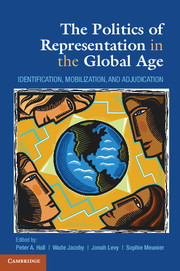Book contents
- Frontmatter
- Dedication
- Contents
- Abbreviations
- Acknowledgments
- Foreword
- 1 Introduction
- Part I The Politics of Interest Representation
- Part II Responding to the Challenges of a Global Era
- 4 Globalization and the Politics of Trade Union Preferences in France
- 5 Public-Private Institutions as Social and Knowledge Bridges
- 6 Reorganizing Representation in Latin America in the Neo-Liberal Age
- Part III New Institutional Settings for Representation
- Short Biographies of Editors and Contributors
- Index
- References
6 - Reorganizing Representation in Latin America in the Neo-Liberal Age
Published online by Cambridge University Press: 05 June 2014
- Frontmatter
- Dedication
- Contents
- Abbreviations
- Acknowledgments
- Foreword
- 1 Introduction
- Part I The Politics of Interest Representation
- Part II Responding to the Challenges of a Global Era
- 4 Globalization and the Politics of Trade Union Preferences in France
- 5 Public-Private Institutions as Social and Knowledge Bridges
- 6 Reorganizing Representation in Latin America in the Neo-Liberal Age
- Part III New Institutional Settings for Representation
- Short Biographies of Editors and Contributors
- Index
- References
Summary
In the past quarter century Latin America has experienced a single economic transformation from a model of closed economies directed largely by states to one of economies open to international and private markets. Some countries embraced what has been referred to loosely as “neo-liberalism” more tenaciously than others and some stayed the course while others reverted to the old ways of state intervention, but none – bar Cuba – escaped altogether.
The retreat of the state from regulating labor markets and serving as the engine of employment and distribution fundamentally challenged familiar channels of political representation. Whereas many hoped economic liberalism would trigger a turn to pluralist interest representation, others despaired that it would destroy social solidarities and any hope of effective political representation. Now, two decades after the launch of most of the reforms, neither the liberal hope nor the critical nightmare has prevailed everywhere; political parties in some countries serve well their function of offering contending programs of government and sinking roots into the electorate, but in others, those that control the state have destroyed old parties on the altar of neopopulism or used them to persist in distributing public resources for personal political gain in a grand-scale display of clientelism. Indeed, while globalization and neo-liberalism have disorganized older systems of representation, there has been surprising variation in the type of linkages that political parties have built on the ruins of the old that cannot be readily explained by inexorable economic forces, the straightjacket of institutional design, or the weight of history.
- Type
- Chapter
- Information
- The Politics of Representation in the Global AgeIdentification, Mobilization, and Adjudication, pp. 126 - 152Publisher: Cambridge University PressPrint publication year: 2014



